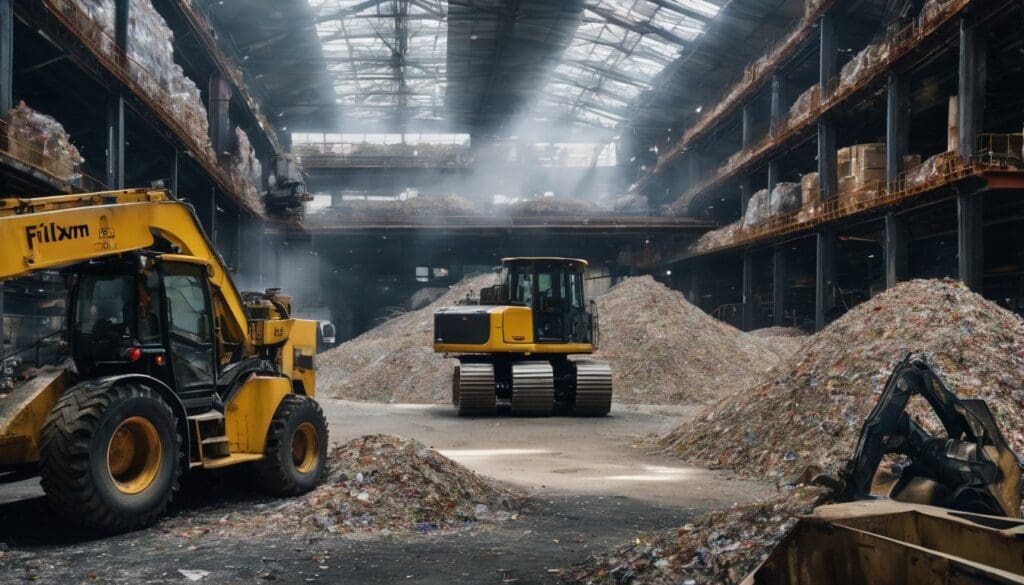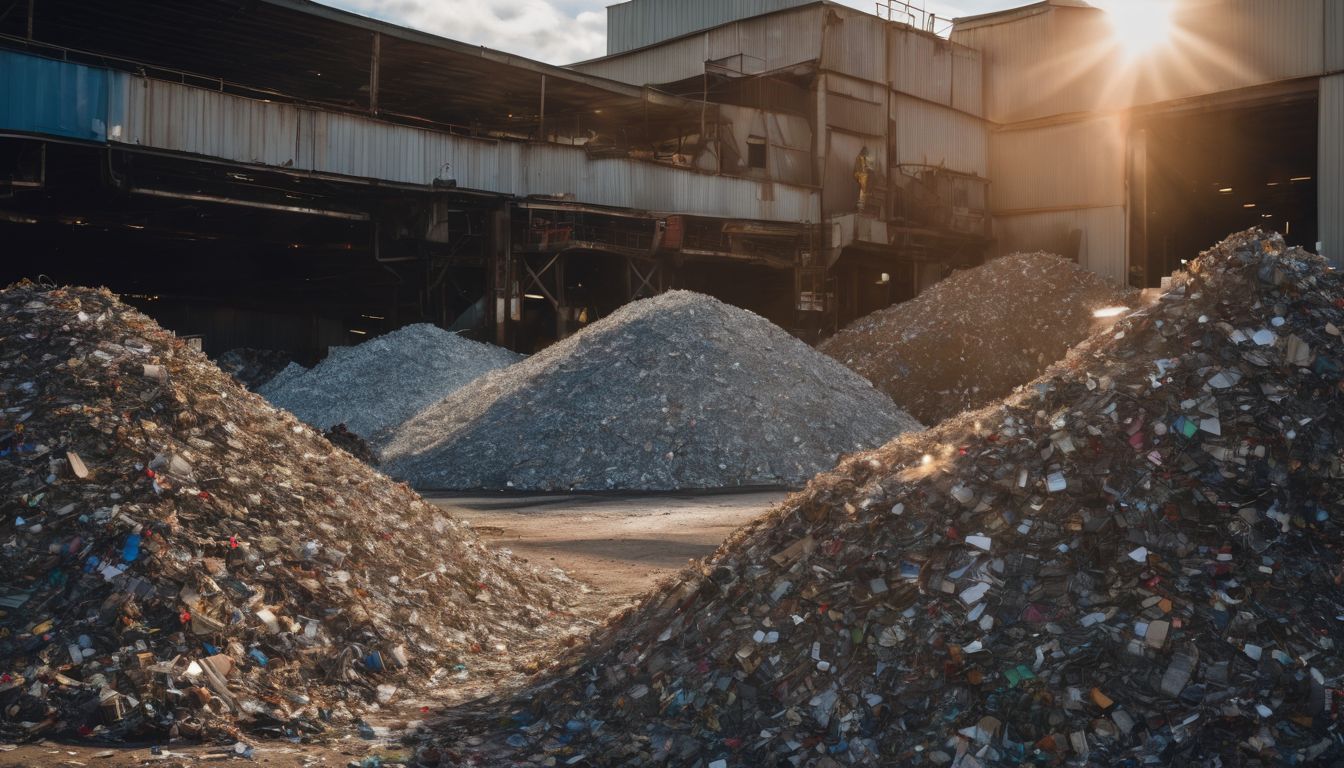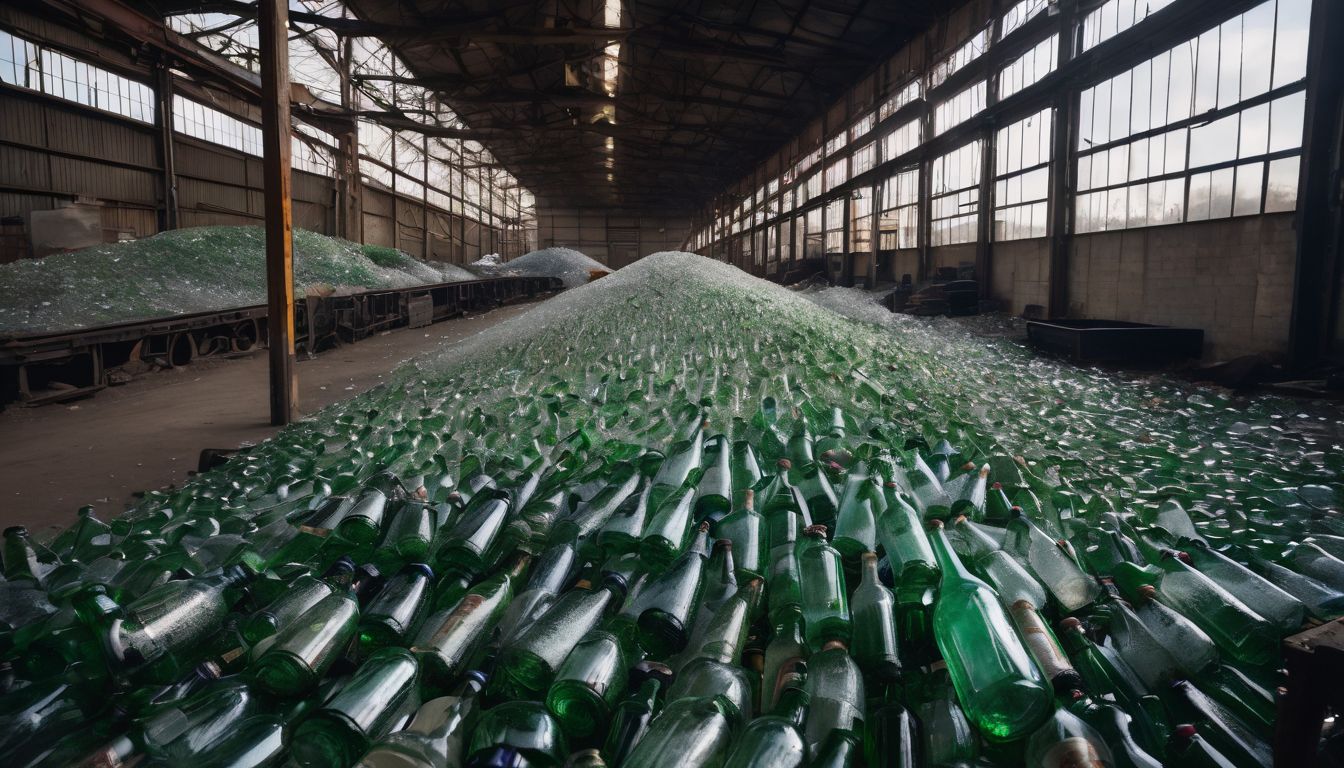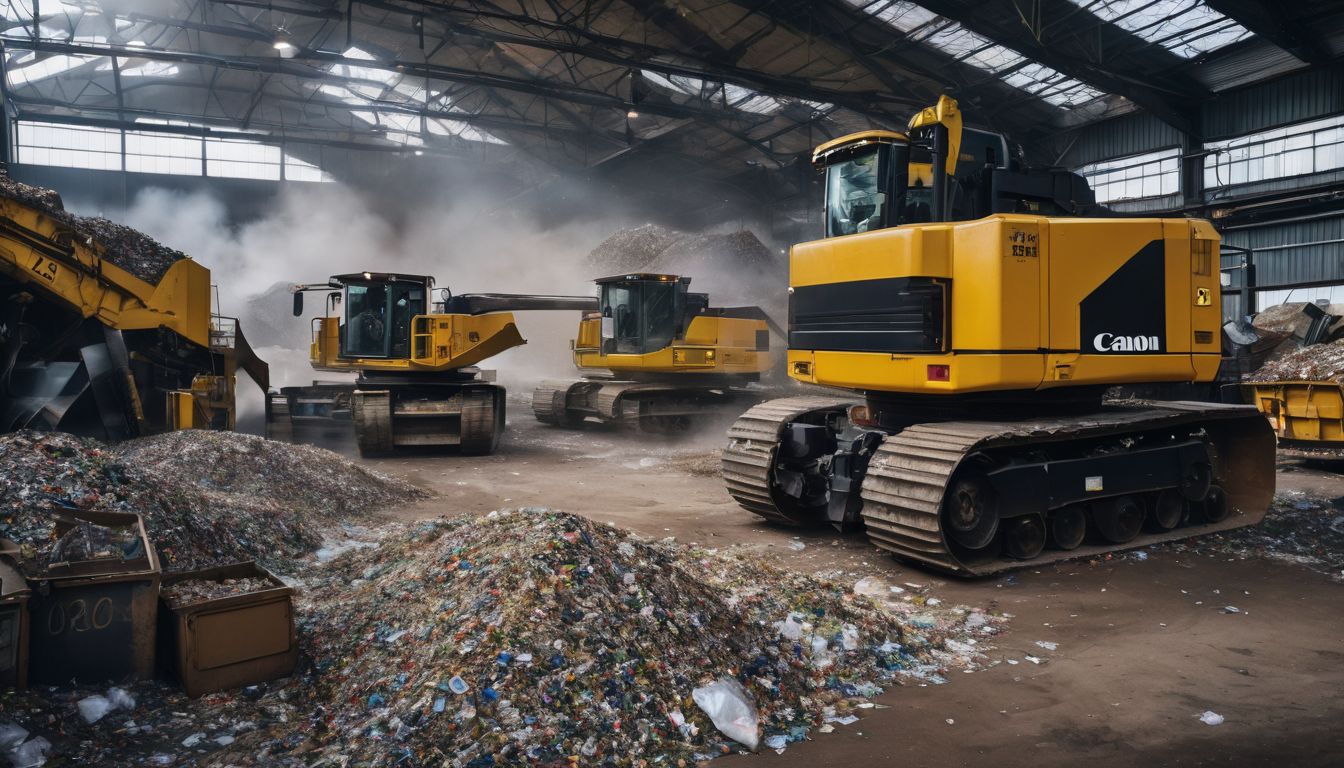Are you worried about the piles of rubbish we create every day? Here’s a fact: Recycling can significantly cut down what ends up in our overflowing landfills. In this article, we’ll explore how recycling makes a real difference to our planet, helping to save resources and reduce pollution for cleaner air and water.
Stick around – it’s easier than you think to make an impact!
Key Takeaways
- Recycling conserves important natural resources like timber and minerals by reducing the need for new raw materials, helping to protect fragile ecosystems and save energy.
- By diverting waste from landfills, recycling lessens methane gas production and lowers greenhouse gas emissions, which is vital in the fight against climate change.
- The practice of recycling can generate revenue from selling recyclable materials while also providing cost savings for businesses and governments through reduced waste disposal needs.
- Preserving resources through recycling minimises environmental damage now and secures these valuable materials for future generations’ use.
- Embracing a culture of recycling contributes to cleaner air and water by preventing pollution associated with manufacturing new products from virgin resources.
Benefits of Recycling for the Environment
Recycling helps to conserve natural resources and reduce the amount of waste sent to landfills. It also leads to lower energy consumption and greenhouse gas emissions, as well as preventing air and water pollution.
Conservation of natural resources
Conserving natural resources means using materials more wisely and minimising waste. Recycling plays a crucial role in this effort by turning what we often consider rubbish into valuable raw materials.
Think about all the paper, glass, metal, and plastics that get tossed out every day; these can serve new purposes instead of being lost forever. By recycling them, we save trees, reduce the need to mine new metals or drill for oil, and lessen our impact on Earth’s fragile ecosystems.
The process also ensures that renewable resources like water are shielded from pollution because many recycling methods are cleaner than traditional manufacturing processes. With every item you recycle, you contribute to a sustainable cycle where fewer virgin materials are needed—this is the heart of a circular economy.
Promoting environmental sustainability through resource conservation lessens your carbon footprint and bolsters climate action efforts without compromising the ability of future generations to meet their own needs.
Reduction of waste sent to landfills
By recycling, we can prevent tonnes of waste from ending up in landfills. This drastically reduces the amount of methane gas produced by organic waste decomposing in these sites and minimises the need for additional landfill space.
Moreover, recycling inorganic waste like paper, glass, and plastic diverts significant amounts of material from entering landfills, which generally contributes to lower greenhouse gas emissions.
Further benefits include lessening the environmental impact caused by leachate and other pollution resulting from landfill decomposition processes. Additionally, it enables us to conserve natural resources that would have been expended in producing new items.
Lower energy consumption and greenhouse gas emissions
Recycling reduces energy consumption and greenhouse gas emissions by decreasing the need for producing new materials from raw resources. By reusing materials to make new products, the manufacturing process consumes less energy, resulting in lower carbon emissions.
This helps in the fight against climate change, as fewer greenhouse gases are released into the atmosphere during production.
Additionally, recycling decreases reliance on fossil fuels often used in manufacturing processes. By reducing the demand for these non-renewable resources, recycling contributes to a more sustainable and eco-friendly approach to product creation.
Prevention of air and water pollution
Preventing air and water pollution is a crucial benefit of recycling. By reusing materials, we can reduce the amount of waste that ends up in landfills, which in turn lowers the release of harmful chemicals into the air and water.
Through recycling, we can mitigate the environmental damage caused by manufacturing processes and decrease the risk of contamination to our precious water sources.
Recycling also plays a vital role in reducing greenhouse gas emissions associated with producing new products from raw materials. When we recycle, we conserve energy and cut down on air pollution from industrial activities such as mining and refining.
Recycling and Climate Change
Recycling plays a crucial role in reducing emissions and protecting natural habitats, making it an essential tool in the fight against climate change. Learn more about the environmental impact of recycling by reading the full blog!
Reduction of emissions
Recycling reduces emissions by decreasing the need for raw material extraction and processing. It also lessens energy consumption in manufacturing, thus lowering greenhouse gas emissions.
By recycling materials like paper, glass, and metal, we cut down on the carbon footprint associated with producing new items from virgin resources. This helps in protecting the environment and combating climate change.
Reducing emissions through recycling preserves natural habitats and mitigates air and water pollution. The eco-friendly practice of resource recovery significantly contributes to waste reduction while promoting green technology.
Protection of natural habitats
Protecting natural habitats is a crucial benefit of recycling. When we recycle, we reduce the need for raw materials like timber, oil, and minerals, which in turn helps to preserve ecosystems such as forests, wetlands, and oceans.
Recycling also minimises the destruction of wildlife habitats caused by resource extraction and manufacturing processes. By embracing a culture of recycling, we can contribute to safeguarding the diverse plants and animals that rely on these precious environments.
Furthermore, recycling lessens the demand for new landfills and incinerators. This directly results in the preservation of natural areas from being converted into waste disposal sites or suffering from pollution.
Ultimately, this supports biodiversity and ensures that future generations can continue to enjoy thriving natural habitats rich with diverse plant and animal life.
Economic Benefits of Recycling
Recycling offers economic benefits such as generating revenue from recyclable materials and cost savings for businesses and governments. Read more about the positive impact of recycling on the environment and future generations.
Revenue from recyclable materials
Recycling offers a significant economic benefit through the generation of revenue from recyclable materials. By collecting and processing items like paper, glass, and metal, recycling facilities can sell these materials to manufacturers who use them as raw materials, contributing to a circular economy.
This not only reduces the need for virgin resources but also supports businesses that rely on recycled content in their production processes.
Generating revenue from recyclable materials plays a crucial role in creating financial incentives for individuals and businesses to participate in recycling programs. It encourages environmental stewardship while providing economic opportunities, contributing to a sustainable future and supporting conservation efforts.
Cost savings for businesses and governments
Businesses and governments can achieve significant cost savings through recycling. By reducing the amount of waste sent to landfills, businesses can lower their disposal costs and potentially reduce taxes or fees associated with waste management.
Additionally, reusing materials lowers the need for purchasing new resources, leading to decreased production costs. This not only benefits the environment but also offers financial advantages for businesses aiming to operate sustainably.
Recycling also presents economic opportunities for governments by creating jobs in the recycling industry and generating revenue from selling recyclable materials. Municipalities may find reduced spending on landfill management and waste removal as a result of effective recycling programs.
The Impact of Recycling on Future Generations
Preservation of resources for future use and reduced environmental damage are crucial benefits of recycling that will have a positive impact on future generations. To learn more about the environmental impact of recycling, continue reading our blog.
Preservation of resources for future use
Preserving resources for future use is crucial for ensuring a sustainable environment. By recycling materials such as paper, glass, and plastic, we can reduce the demand for raw materials and lessen the strain on natural resources.
This proactive approach supports a greener, more eco-friendly future by safeguarding valuable resources for generations to come.
Conserving resources through recycling not only benefits the present but also contributes to the long-term well-being of our planet. It allows us to minimise environmental damage while promoting responsible consumption and reducing waste accumulation.
Reduced environmental damage
Recycling reduces environmental damage by decreasing the demand for raw materials, thereby conserving natural resources. It also helps in minimising air and water pollution produced during the extraction and processing of virgin materials.
By diverting waste from landfills through recycling, there is a significant reduction in greenhouse gas emissions, contributing to a healthier planet for future generations.
Recycling plays an essential role in protecting ecosystems and wildlife habitats. Through the reuse of materials, it lessens the pressure on extracting new resources which can lead to habitat destruction.
Conclusion
In conclusion, recycling has a positive impact on the environment by conserving natural resources and reducing waste in landfills. It also plays a significant role in lowering energy consumption and greenhouse gas emissions.
The practice of recycling contributes to the protection of natural habitats and helps combat climate change by reducing harmful emissions. Additionally, it supports economic benefits such as revenue from recyclable materials and cost savings for businesses and governments.
Lastly, recycling ensures that future generations have access to preserved resources, ultimately leading to reduced environmental damage.
FAQs
1. What does recycling do for the environment?
Recycling helps the environment by reducing waste, saving natural resources, and cutting down on pollution.
2. Is recycling always eco-friendly?
Mostly yes, but the environmental impact of recycling can vary depending on how materials are collected, processed and reused.
3. How does recycling impact our natural world?
Recycling impacts our natural world positively by conserving raw materials and protecting ecosystems from excess waste damage.
4. Can we reduce harmful effects through better recycling methods?
Absolutely! By improving recycling methods, we can make the process more ecofriendly and further lessen any negative environmental impacts.





